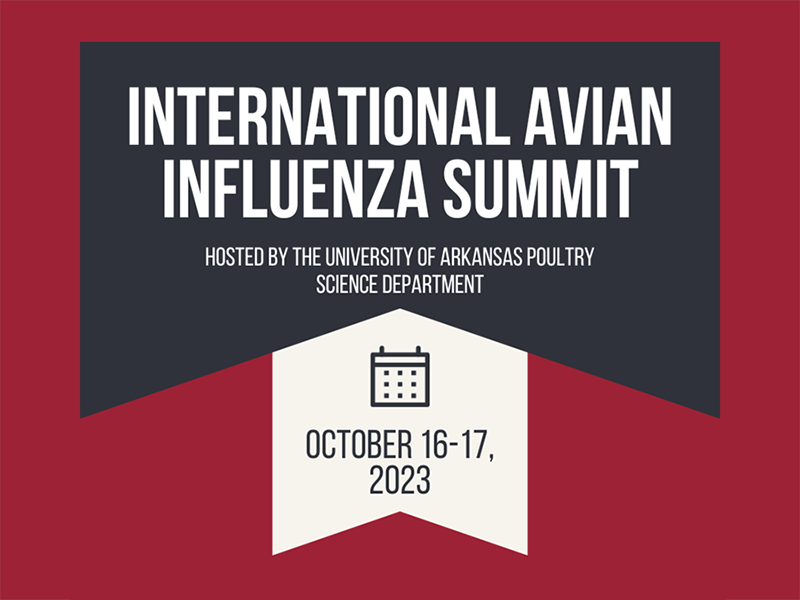The International Avian Influenza Summit will bring hundreds of poultry industry professionals together for two days in October to address the global challenges of avian influenza.
Guillermo Tellez-Isaias, research professor for the Center of Excellence for Poultry Science and the Arkansas Agricultural Experiment Station, chairs the organizing committee for the summit. He said the event will address the effects of highly pathogenic avian influenza, or HPAI, which has wreaked havoc on the poultry industry worldwide since the latest outbreak began in 2022. According to the World Health Organization, 67 countries on five continents reported HPAI in poultry and wild birds. In 2023, another 14 countries reported outbreaks, mostly in the Americas. This year in the U.S., HPAI was confirmed in 47 states, affecting 58.7 million birds.
"HPAI is a highly contagious, often fatal disease that affects poultry and wild birds," Tellez-Isaias said. "It can cause a rapid decline in flock health and significant population declines. A major HPAI outbreak could have a devastating impact on this industry, leading to job loss and higher food prices."
The Center of Excellence for Poultry Science is a unit of the U of A System Division of Agriculture and the U of A's Dale Bumpers College of Agricultural, Food and Life Sciences. The center represents the three land grant mission areas of teaching — carried out through Bumpers College — and research and extension through the Division of Agriculture's Arkansas Agricultural Experiment Station and Cooperative Extension Service.
The summit aims to foster collaboration among experts, scientists, lawmakers, farmers, academia and other stakeholders in the poultry field, Tellez-Isaias said. The two-day, hybrid event will be held Oct. 16-17 at the Don Tyson Center for Agricultural Sciences, 1371 W. Altheimer Dr., in Fayetteville.
Approximately 20 speakers from around the world will provide unique perspectives of how avian influenza has affected different countries and various segments of the industry. Topics will include:
- Avian influenza in Brazil, Peru, Chile, Mexico and the United States
- Avian influenza in wild birds
- Prevention strategies for avian influenza
- Mortality management
- Avian influenza in commercial egg farms
- Avian influenza in commercial turkey farms
- Biosecurity
Tellez-Isaias said he encourages anyone with an interest in poultry to attend the free event, either in person or online.
"This summit will be a great opportunity to network with other professionals who are working to address the challenges posed by avian influenza," he said. "Participants will gain insight from leading experts in the field, stay up to date on the latest HPAI developments and get involved in efforts to prevent and control it."
To learn more about this event and to register, please visit the International Avian Influenza Summit website.
To learn more about Division of Agriculture research, visit the Arkansas Agricultural Experiment Station website: https://aaes.uada.edu/. Follow us on Twitter at @ArkAgResearch. To learn about extension programs in Arkansas, contact your local Cooperative Extension Service agent or visit www.uaex.uada.edu. Follow us on Twitter and Instagram at @AR_Extension. To learn more about the Division of Agriculture, visit https://uada.edu/. Follow us on Twitter at @AgInArk.
About the Division of Agriculture: The University of Arkansas System Division of Agriculture's mission is to strengthen agriculture, communities, and families by connecting trusted research to the adoption of best practices. The Division of Agriculture conducts research and extension work within the nation's historic land grant education system through the Agricultural Experiment Station and the Cooperative Extension Service. The Division of Agriculture is one of 20 entities within the University of Arkansas System. It has offices in all 75 counties in Arkansas and faculty on five system campuses. The University of Arkansas System Division of Agriculture offers all its Extension and Research programs to all eligible persons without regard to race, color, sex, gender identity, sexual orientation, national origin, religion, age, disability, marital or veteran status, genetic information, or any other legally protected status, and is an Affirmative Action/Equal Opportunity Employer.
Topics
Contacts
Jessica Wesson, communications manager
Poultry Science Department
479-575-3327, jlwesson@uark.edu
